Convocation Program
The Class of 2025
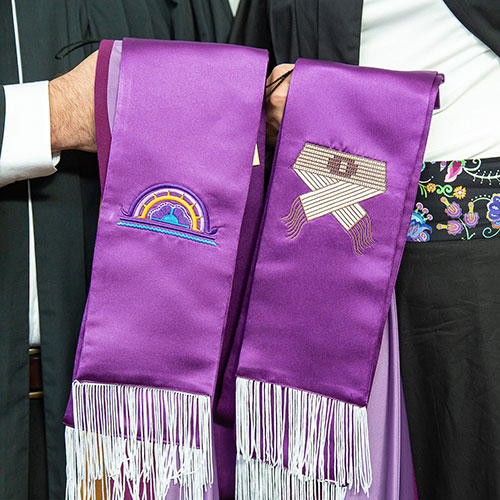
Indigenous graduates will receive a unique stole with symbolic meaning. One side of the stole depicts the Dish with One Spoon Treaty Wampum Belt between the Haudenosaunee and Anishnaabe. This land is part of the Dish with One Spoon Treaty between the Haudenosaunee and Anishnaabe peoples and symbolizes the agreement to share, protect our resources and not to engage in conflict.
On the other side of the stole is the Office of Indigenous Initiatives logo. Based on the Haudenosaunee creation story, our logo reminds us of how the first seeds of life on Earth were planted on the back of a turtle. The inner segments of the dome represent the Anishnaabe (Ojibway) Seven Grandfather Teachings: love, respect, wisdom, bravery, truth, honesty and humility. The golden rays of the sun symbolize enlightenment, learning and new beginnings. The Métis beaded purple flower represents the gifts of plant life from the Skyworld, which encourage and sustain life. The entire design rests on the waters of life.
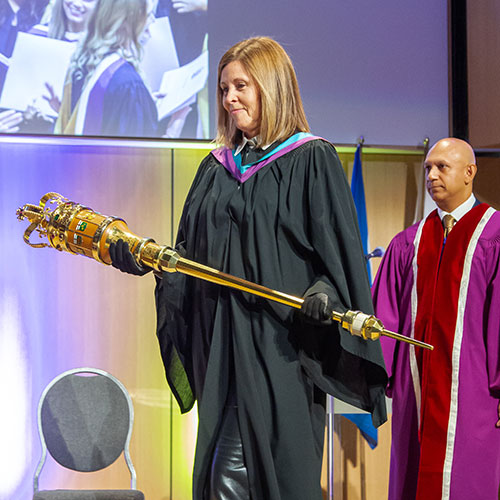
The mace of Wilfrid Laurier University was officially presented by the Euler family at the 1963 fall convocation in memory of The Honourable W.D. Euler, former senator of Canada and the first chancellor of the university. It weighs 16 pounds and was manufactured by the firm of Henry Birks Limited, Montreal.
The ferrule near the base of the shaft contains ivory from a walrus tusk obtained from Coral Harbour, Northwest Territories. The ten-sided shaft, representing the ten provinces, merges into the head of the mace which bears the ten provincial crests. The wood used at the point where the shaft meets the head of the mace is elm taken from the bannister post of Conrad Hall, the original seminary building. Above this are four crests relating to the history of the institution: a crest of Waterloo County, the Luther Coat of Arms, the crest of the Waterloo Lutheran Seminary and the coat of arms of the University of Western Ontario.
The head of the mace is made of maple and bears the Federal Coat of Arms, above which is the monogram of Queen Elizabeth II, during whose reign the university's charter was granted. On the reverse side is the crest of Wilfrid Laurier University and the monogram of King George V, during whose reign the original charter was granted. The top of the mace is a crown, mounted with jewels, symbolizing the authority of the State.
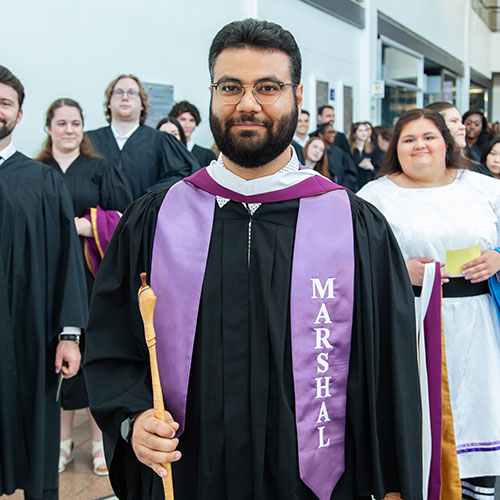
Dr. Fred Binding, a faculty member in the Department of Psychology for 32 years retired in July 2003. He had served as the university marshal for ten years. Sadly, Dr. Binding died in August 2003. In memory of his contribution to convocation ceremonies, artist Rex Lingwood was commissioned to create a marshal's baton.
In the baton, the artist incorporates a range of visual references that relate to the graduation ceremony, both directly and symbolically. In keeping with the nature of the ceremony, some of the forms are traditionally associated with ceremonial staffs, and the baton's design echoes the elaborate theatricality of the event and the flair brought to the occasion by Dr. Fred Binding. The ends may be read as abstracted figure forms wrapped in the academic gown and hood, with details symbolizing the life stage of the graduates. The Greek alphabet is inset into the internal side surface in the shaft of the baton. This is a reference to the interests of Dr. Fred Binding. It also acknowledges that language is at the core of university education and that the Greek language has particular importance in western culture.
The commission of the baton was made possible with the generous support of the Department of Psychology and Wilfrid Laurier's University Retirees' Association.
The academic degree is a title conferred on an individual by a university as recognition of the completion of a course of study or for a certain attainment. In Canada, the three stages in higher education are represented by the degrees of bachelor, master, and doctor. Wilfrid Laurier University is given the authority to grant degrees by the Wilfrid Laurier University Act.
The bachelor’s degree is awarded at the honours, without honours or general specified, or the general level. An honours degree program emphasizes the acquisition of a broad and deep knowledge of the student’s chosen honours subject. The four-year bachelor's without honours or general is awarded to students who have met all honours course requirements and includes their specialization. A general degree program emphasizes a balance between an in-depth understanding of the student’s major subject and a knowledge and appreciation of other fields.
The master’s degree is the second degree in higher education. Students complete concentrated and specialized work at a more advanced level in an academic discipline or professional area. Most course work is within the field of specialization and a research project or thesis is normally required. Some master’s degrees provide professional qualifications.
The doctoral degree is the highest academic degree granted by a university. Candidates for the degree spend several years in the advanced study of a specialized field of knowledge. The capstone of the degree is the doctoral dissertation, an extended work based upon independent research. The dissertation demonstrates the candidate’s command of both the subject matter and the exacting methods of scholarship, and makes an original contribution to knowledge.
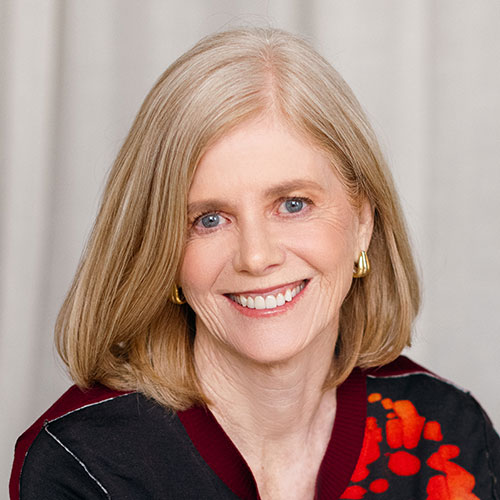
Honorary Doctor of Laws | Presented on Oct. 16, 9:30 a.m., Waterloo
As a trailblazer, mentor and advocate for women in leadership, Barbara Stymiest has demonstrated exceptional leadership as a senior executive for over 20 years in Canada’s financial and corporate sectors. With an Honours Business Administration degree from Western University’s Ivey School of Business and a Chartered Accountant designation, Stymiest began her career at Ernst & Young, eventually becoming a partner. In 1999, as the first female CEO of the Toronto Stock Exchange, she led the organization’s transformation into a publicly traded company (TMX Group Inc.), expanded its market presence, and modernized its technology infrastructure. She joined the Royal Bank of Canada as chief operating officer from 2004 to 2011. Her governance experience includes board roles with BlackBerry, George Weston Limited, President’s Choice Bank and Sun Life Financial. Stymiest has made community-level impacts as a volunteer in the non-profit sector with the Canadian Institute for Advanced Research and as vice-chair of the University Health Network. She advises AGE-WELL and Health Data Research Network Canada on healthcare and aging technologies. Her numerous recognitions include multiple listings on Fortune’s “50 Most Powerful Women” and as a Member of the Order of Canada.
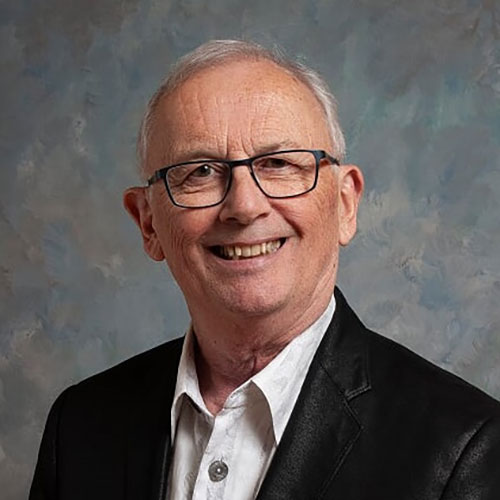
Order of Wilfrid Laurier University | Presented on Oct. 21 at 2 p.m., Brantford
As a child in the 1940s, Paul Williamson contracted polio, and recalls being towed in a wagon to school by his sisters. That boy thrived and went on to found financial services firm The Williamson Group Inc. in 1976. A second-generation chair of the Brant United Way, Williamson and his family have given tirelessly to the agency and its many member organizations. As true champions of Laurier, Williamson and his late wife Margot, who passed away in 2024, have supported the growth of the Brantford campus, including the Research and Academic Centre, the LaunchPad entrepreneurship program, the Laurier Brantford YMCA, and students in the Faculty of Education. Williamson is a fellow of the Institute of Chartered Accountants; a recipient of both the King Charles III Coronation Medal (2025) and the Queen Elizabeth II Diamond Jubilee Medal (2012); the first civilian Honorary Colonel of the 56th Field Artillery Regiment; and was honoured with a lifetime achievement award by the Brantford Brant Chamber of Commerce.
Graduates listed in this program have been certified as completing all degree requirements as of Oct. 6, 2025.
Hiromichi Kato
Faculty of Science
Hiromichi Kato
Faculty of Science
Noah Joseph Battaglia
Faculty of Science
Hannah Joy Denberg
Faculty of Science
Jina Dong
Lazaridis School of Business and Economics
Kaylen Alexander Ellen Lamb
Lyle S. Hallman Faculty of Social Work
Sophie Renée Landry
Faculty of Science
Remy Evanston Leigh
Faculty of Arts
Mingjie Liu
Lazaridis School of Business and Economics
Ana Perunicic
Lazaridis School of Business and Economics
Tara S. Pryke
Lyle S. Hallman Faculty of Social Work
Larissa Jacqueline Puls
Faculty of Education
Elizabeth Jacqueline Spence
Faculty of Arts
Lauren Emma Whiteside
Lazaridis School of Business and Economics
Alexandra Anne Wrigley
Faculty of Music
Kaiyue Wu
Lazaridis School of Business and Economics
Christopher Eric Kellestine
Faculty of Human and Social Sciences
Arthur Chen
Lazaridis School of Business and Economics
Adam Anthony Colafranceschi
Faculty of Science
Jakob Thomas De Melo
Lazaridis School of Business and Economics
Miriam Maud Drysdale
Faculty of Music
Matthew William Jenereaux
Lazaridis School of Business and Economics
Rachel Erinn Lawrie
Faculty of Arts
Jiayi Mao
Lazaridis School of Business and Economics and Faculty of Science
Alissa Misic Herrera
Lazaridis School of Business and Economics
Nadezhda Vorobieva
Lazaridis School of Business and Economics
Jacqueline Baak
Faculty of Human and Social Sciences
Vanessa Currado
Faculty of Liberal Arts
Sayak Sneddon-Ghosal
Lyle S. Hallman Faculty of Social Work
Abigail Sarah Bonder
Faculty of Science
Natalie Blyth McLean
Faculty of Arts
Congratulations on your graduation – you made it! Today, we welcome you to the Wilfrid Laurier University Alumni Association (WLUAA).
You are now a member of a community of more than 120,000 proud graduates of Wilfrid Laurier University and its predecessors.
WLUAA represents all Laurier alumni, including you. We support Laurier with revenue from alumni services, such as group home, auto and life insurance, and an alumni affinity credit card.
WLUAA revenues help to fund alumni programs and events, university initiatives, student groups, and student scholarships.
The association’s mission is to engage and represent a community that supports and enriches our alumni, students, and the university. We share a vision for an inspiring community of engaged alumni.
You are alumni for life — your relationship with Laurier doesn’t end today. Stay connected as a proud grad and learn more at LaurierAlumni.ca.
